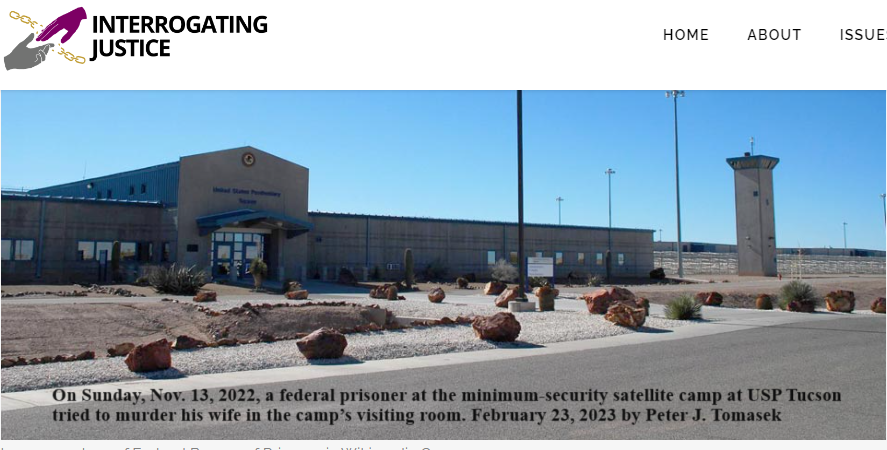VIOLENCE IN CAMPS IS RARE
WHILE RARE, IT CAN HAPPEN.
RESPECT.
When dealing with violence, it is crucial to empower yourself by understanding the power of and prioritizing the need for respect. Respect has universal value, forming the bedrock of positive interactions. Part of its power is that in prison, Respect, What You Do, and Your Emotions are the only things you can control. Always ask permission before sitting on someone else’s bed or borrowing anything (try not to borrow). It is empowering (AND CRUCIAL) to return ALL items borrowed in the same condition you received them and avoid owing anyone money. This should not even be a topic of conversation! These simple actions can help create a harmonious and respectful environment for everyone.
What happened in Tucson is very – very rare. Still, I have two pieces of advice: 1) if you fall into the “normal” category, you have nothing to worry about as long as you don’t Look for trouble, and 2) if your charge puts you into a category that may invite concerns, you and your attorney need to discuss this. Otherwise, once in the BOP, they are a big agency and only step in after an incident which may result in placing you in Isolation (The SHU, for Years, creating mental health issues), a transfer, where this may start all over (or may not), or worse…
I’m Dr. Marc Blatstein. I’ve been where you are and am here to help you on your journey. With work, I got my license reinstated and my career back. While I can’t make promises, preparing for the PSI is critical for a successful journey; from my experience, it is both needed and helpful.
Preparation for release (at least considering it) before their PSI is a start in the right direction. They may do something completely different, but having a Plan and Daily Routine for day 1 in prison as to what to expect is a good start.
The repercussions of getting into trouble in a satellite or federal prison camp are severe. You could face additional charges, be transferred to a higher-security prison, and/or lose all your earned time credits (ETC) and good time credit (GTC).
While not frequent, they do occur.
- Medium-Security – Tucson
- Derek Chauvin (stabbed), 47, the former Minneapolis police officer convicted of murdering George Floyd
- Minimum-Security Satellite Camp at USP Tucson
- A federal prison inmate who was able to obtain a firearm at a prison camp in Arizona pulled out the gun in a visitation area and attempted to shoot a visitor.
According to Peter J. Tomasek, an attorney and writer for Interrogating Justice, no changes appear on the horizon; it’s just as it’s been. The new BOP Director has much work to do.
During your trial or plea, you may have felt that you are not guilty. It’s important to remember that there are many innocent people in prison, as well as too many people incarcerated in the US.
For those who believe they are innocent and are fighting through an appeal, I recommend asking your attorney how many appeals (or trials) they have won. It’s important to note that the Department of Justice has a close to 95-98% conviction rate, making the odds of winning very low. Speaking from personal experience, I lost my appeal, and the judge sent me back to prison. It was a challenging experience.
“If you’ve realized that, while you may have believed in your innocence, some aspects of the charges were indeed accurate, no matter how minor, it’s important to focus on what you can influence by sharing with your legal counsel and writing your Narrative and Release Plan, letting the rest unfold naturally.”
If you have not yet prepared a well-thought-out Personal Narrative before your pre-sentence interview and sentencing hearing or have not created a Release Plan, it’s never too late to include these crucial steps.
These are crucial for the judge, the court, and the correction staff (warden, case managers, and unit team). They need to see that you take responsibility, feel remorse for the victims you have harmed and can tell your life story. Failing to do so means that the Department of Justice has already shared your story with the world through your indictment, and it may not paint you in a positive light.
Wiser individuals than I have said, using their example,
- If you think there’s life after prison and release, You’re Right,
But,
- If you feel there’s no life after prison and release, You’re Also Right.
“Whether you think you can, or you think you can’t–you’re right on both counts.” ― Henry Ford
I never knew this to be true because I felt I couldn’t fail, but trust me when I say I initially took minimum wage jobs before reinstating my medical license.
So, we all go through this: Now that you’re in prison, and if you’re lucky, before your pre-sentence interview and sentence, if you’ve had a change of heart regarding your charge, this is the perfect time to take ownership of the crime. What does this mean? It’s never too late to regain your soul.
Judges understand that crimes don’t occur in a vacuum. Attorneys are paid to keep you out of prison. The Department of Justice wants a conviction, no matter what it takes. The Prosecutor wants prison time because they believe you are responsible for all the world’s sins, and they may even have political aspirations.
Judges aim to comprehend the reasoning behind your actions. However, they are also skilled at detecting lies, which can negatively affect you during your discussions with the court (your Allocution).
Remember that judges from across the country unanimously agree that your narrative, release plan, acceptance of responsibility, and demonstration of remorse for the harm caused to your victims can significantly influence the scales of justice in your favor.


